It’s the genre of a million names—self help, personal development, personal growth, self improvement. . . . And the opinions on it are just as numerous. Many people avoid these types of books like the plague, but I can’t get enough of them. It’s rare for a book to have an enormous lasting impact on my life, but I fully believe that every book (all books, but especially books within this genre) gets me just a little bit closer to the person I want to be. Here’s a look at four personal development books I’ve read in recent months.
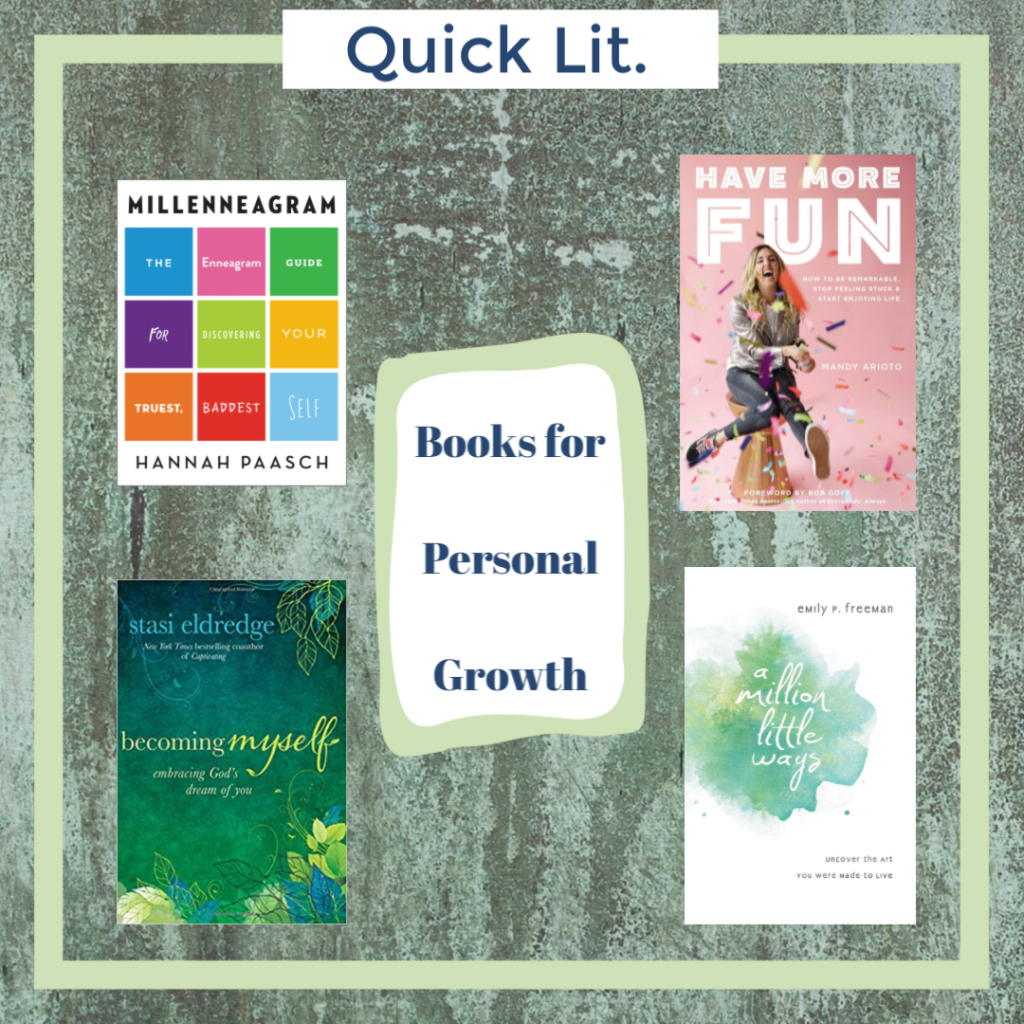
Have More Fun: How to Be Remarkable, Stop Feeling Stuck, and Start Enjoying Life, by Mandy Arioto: If there’s one thing I’ve never been accused of, it’s being “too fun.” In fact, on nearly every personality test I’ve ever taken, “having fun” is the area where I score the lowest. I don’t love this about myself and have made many attempts to lighten up (see my Word of the Year post), so when my MOPS book club chose this as our book selection last September, I knew it was just what I needed to read.
As the CEO of MOPS, Mandy Arioto is no stranger to success, yet she doesn’t take herself too seriously. Arioto excels at infusing fun into every aspect of her life, from work to parenting to marriage, and in this book she offers suggestions for other women to do the same. In chapters focusing on various areas of a woman’s life, Arioto shares personal anecdotes and stories from other inspiring women whose lives have been improved by simply having more fun.
Arioto is a good storyteller and I found her stories both humorous and inspiring. However, as a whole this book failed in its promise to help moms “be remarkable, stop feeling stuck, and start enjoying life.” The premise of the book—that fun is the key to happiness, fulfillment, and purpose—really doesn’t hold water, and Arioto’s tips and suggestions are unimaginative and applicable to only a certain type of woman (the type who is probably already having plenty of fun); most of her ideas honestly don’t sound all that fun to me, and I doubt that I’m alone.
The book claims to be based on science and spiritual truths, but there is very little of either in this book (with the minimal theology being a bit…shaky). And I was particularly disappointed by the quality of the writing, especially after having been deeply impressed with Mandy Arioto’s previous book.
I’m glad that I read this, as it helped to set the stage for our MOPS theme for the year, but it isn’t a book I would necessarily recommend to others.
My Rating: 3 Stars.
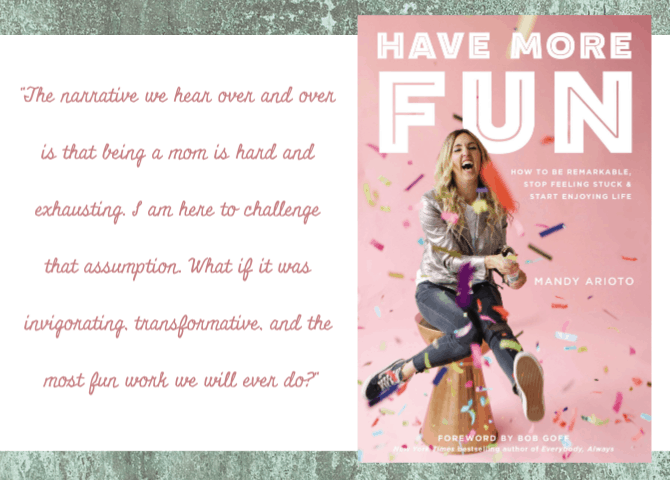
Becoming Myself: Embracing God’s Dream for You, by Stasi Eldredge: I read this book along with an online book club I joined recently. Having previously read Captivating by Stasi Eldridge, and not loving it, I was tempted to pass on this book but decided to give it a shot.
Drawn largely from the author’s own experiences of overcoming her struggles with weight and insecurity, Becoming Myself helps women set aside our hurts, hangups, and negative self-talk to embrace our God-given identities. Eldredge reminds readers that on our own, we are incapable of permanent change, but with God’s help we can heal from childhood wounds and a life of insecurity. Eldredge addresses various sources of hurt (including mother wounds, relationships with other women, and fear) and invites us to step into worship, faith, and our God-given role as His children.
I resonated with this book more than Captivating and thought that Eldredge made some salient points. The book is very woman-centric, addressing identity from a distinctly female perspective in some unique ways: I was intrigued by the discussion of how our hormones play into our spiritual lives, and as a newly minted Girl Mom, I was interested (though didn’t entirely agree with) the way our relationships with our mothers can affect our self image and how we show up in the world. Eldredge also offers some compelling observations on other topics including friendship, soul ties, and the importance of names.
While the book is thought-provoking, Eldredge makes some bold theological claims that I didn’t entirely agree with about our personal desires and the way God works or does not work in our lives. I struggled with Eldredge’s constant equating of weight loss with finding one’s true self (as though our intrinsic identity is correlated with the size of our bodies), and I couldn’t help but notice that many of her ideas about women are based more in cultural ideas of femininity and not Biblical truth.
I read this immediately after reading Sick of Me (reviewed here) which possibly tainted my view of this one, as Becoming Myself is much more self-focused and felt a touch narcissistic to me. Still, this made for a good discussion starter and I’m glad I read it along with a group of like-minded women.
My Rating: 3.5 Stars.
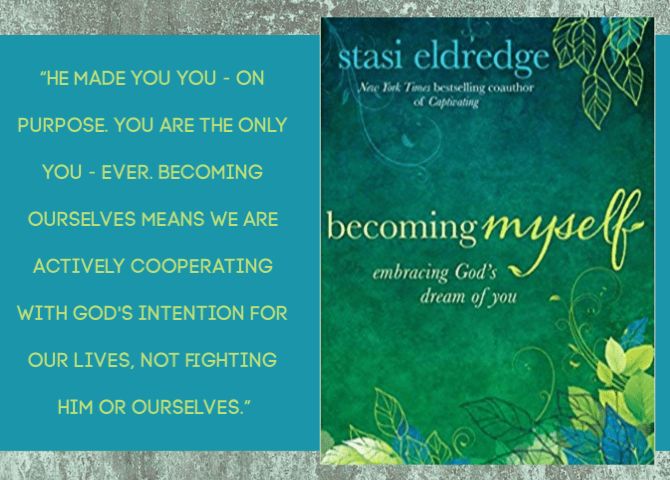
A Million Little Ways: Uncover the Art You Were Made to Live, by Emily P. Freeman: I recently heard an interview with musician Andrew Peterson in which he talked about how much he dislikes being referred to as a “creative.” According to Peterson, it’s not just those who make art for a living who are “creatives,” but ALL of us. In A Million Little Ways, Emily Freeman fleshes out the concept that we are all endowed with the gift of creativity and that, as God’s children, we are called to let him shine through our creativity. Deriving from the Bible’s description of people as “poems,” Freeman explains that everything we do can take the form of art when we approach it with courage, intention, and a desire to glorify God.
Through personal anecdotes and Biblical examples, Freeman walks us through the process of uncovering the art we were born to make, then releasing that art into the world. Her words are beautiful and convicting, a spiritual riff on the concepts Elizabeth Gilbert made popular in her book Big Magic. This book helped me to see how living my life as a masterpiece is God’s desire for me, and can be an act of service, worship, and obedience.
While I love the book’s premise, I don’t know that there is enough content to fill a whole book. I highlighted nearly every word of the first couple of chapters, but by the midway point I felt like I was just reading the same message on repeat. Emily Freeman is one of my favorite thinkers and writers, and while this book is great, it isn’t her best. It was fun to see echoes of her next two books in its pages.
My Rating: 4 Stars.
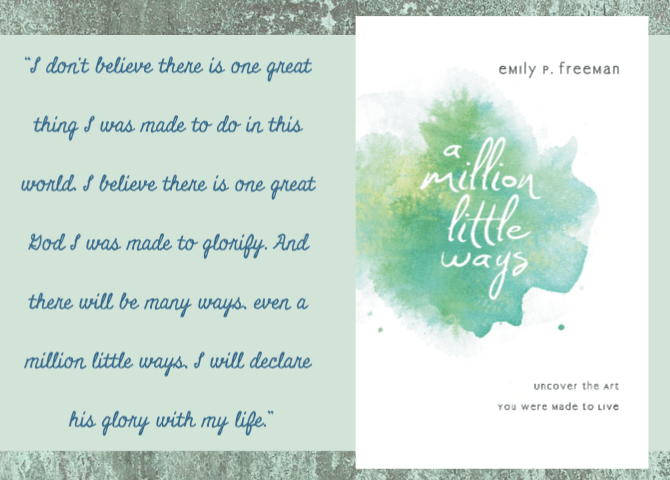
Millenneagram: The Enneagram Guide for Discovering Your Truest, Baddest Self, by Hannah Paasch: I’m always game for a new Enneagram book, and the clever title of this one immediately caught my attention.
The book claims to put a modern spin on the ancient personality typing system. Paasch does provide a good overview of the Enneagram, introducing the nine types and touching on arrows, wings, and subtypes (an aspect of the Enneagram that few books address). The chapters are short and easy to read and incorporate relatable case studies and Paasch’s colorful commentary. I found the “discover your type” quiz at the beginning to be one of the more effective ones I’ve seen, and I liked the humorous sections on how each type handles various situations such as traffic or airplane travel.
While this book provides a good introduction to the system, I don’t feel that it offered anything new. Other than updated names for the nine types, the only way Paasch makes the book “relevant for millennials” is through some very crass language and lots of digs at Christianity (she was raised in the church and has rejected her missionary kid identity in a big way). I was actually amazed by how much foul language she managed to work into her book, and I found it incredibly distracting and totally unnecessary.
My Rating: 3 Stars.
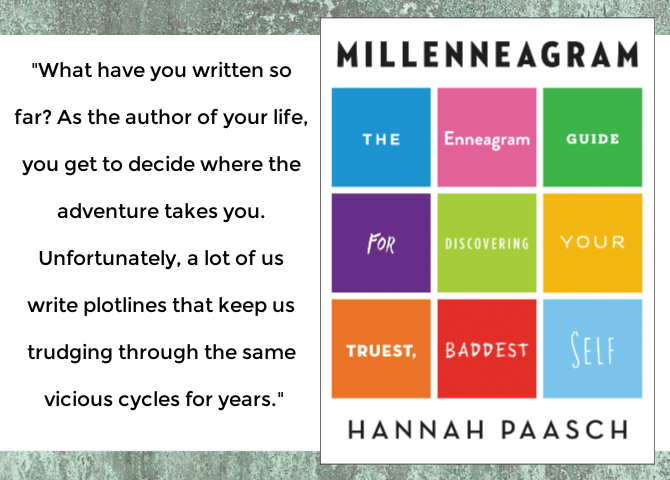
Are you a fan of personal growth books? What’s the best one you’ve read recently?